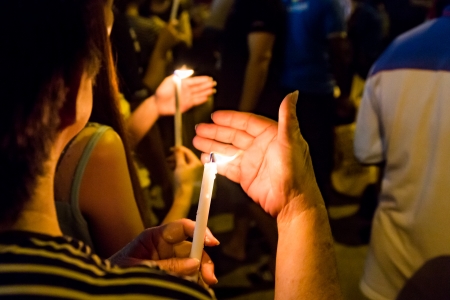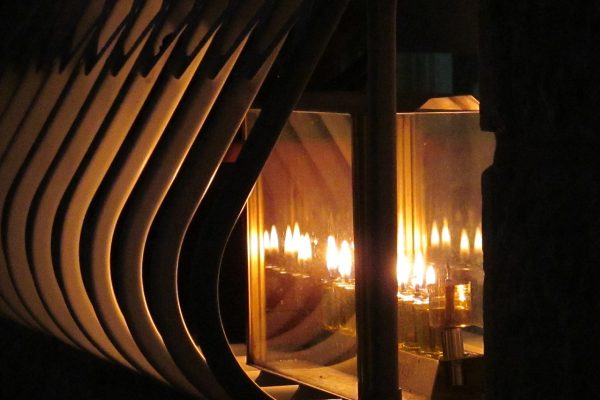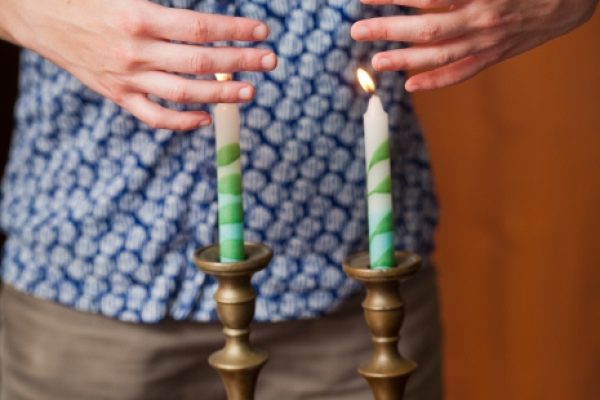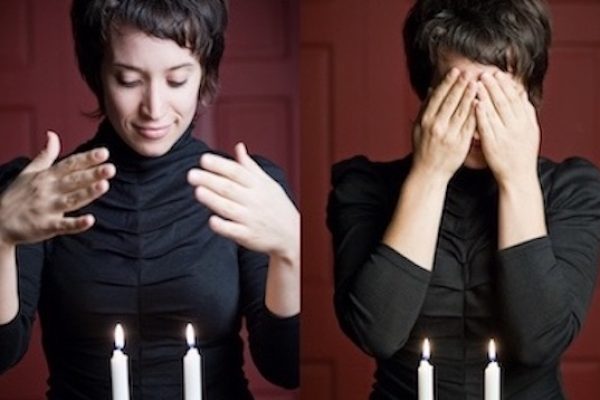Bat Mitzvah:
Thank you for joining me for this important milestone in my life. It is a tradition to have a candle lighting ceremony during the bat mitzvah festivities in order to recognize our family and friends who have had an impact on the celebrant. Tonight, I wish to honor the matriarchs who have paved the way for all Jewish women. I will now pass the candle to my Aunt who will recite a passage illustrating the virtues of the pride and independence of Lilith.
Lilith:
In the beginning, the Lord formed Adam and Lilith from the dust of the ground and breathed into their nostrils the breath of life. God created them, man and woman, from the same source, and so they were equal in all ways. But when Adam tried to subordinate Lilith, she uttered the “Ineffable Name of God” and flew away to lead her own independent life. The first woman was not created from Adam’s rib, but from the Earth – just like Adam.(adapted from Judith Plaskow, “The Coming of Lilith”)
May we be blessed to have Lilith’s pride and independence. May we never lose sight of who we are, where we come from, and where we are headed.
Miriam:
“And Miriam the Prophet, the sister of Aaron, took a timbrel in her hand, and all of the women went out after her in dance with timbrels, and Miriam chanted for them: “Sing to the Lord for God has triumphed gloriously horse and chariot overturned in the sea.” (Exodus 15:20-21)
Like Miriam, may we be blessed to have the courage to stand up and be leaders in our communities. May we never grow weary of giving thanks to our creator and of rallying others and ourselves into song and action.
Bat Mitzvah:
Now my mother and grandmother will light the next candle and recite a passage illustrating the virtues of our matriarchs who embodied modesty, hospitality, compassion, deference to God and industriousness.
Sarah and Rebecca:
As long as Sarah lived, a cloud of glory, which was the Divine Presence, hovered over the entrance to the tent. After she died, that cloud disappeared. But when Rebekah came, the cloud returned.
As long as Sarah lived, her doors were wide open to wayfarers; at her death such hospitality ceased. But when Rebecca came, openness returned.
As long as Sarah lived, blessing was dispatched into the dough she baked; at her death such blessing ceased. But when Rebecca came, the blessing returned.
As long as Sarah lived, a lamp was alight in her tent from the evening of the Sabbath until the evening of the following Sabbath; when she died, the light ceased, but when Rebecca came, the light returned.
And so when he saw Rebecca following in his mother’s footsteps, straightway, Isaac married her.” (Genesis Rabbah 60:16)
The cloud over the tent is modesty: May we too always walk humbly before our creator. The open doors signify hospitality and compassion: May we also create warm and open homes.
The blessing in the dough signifies adherence to the mitzvoth: May we always follow the path that God has set before us.
The burning lamp is a sign of industry – May we, too, be prosperous in all of our endeavors.
Bat Mitzvah:
My aunt will now light the next candle and recite a passage illustrating the virtue of eternal love.
Rachel:
“A voice is heard in Ramah: Lamentation and bitter weeping, Rachel weeping for her children” (Jeremiah 31:15)
Rachel wept for her children out of the deepest love a mother can bear for her family. Her cries are heard throughout the generations of Jewish women. May our love for our families be as profound as Rachel’s. May her cries help us to reach out and comfort our sisters and brothers, and all who are in need. Bat Mitzvah: Now my aunt will light a candle and rectie a passage illustrating the virtue of courage.
Bat Mitzvah:
My sister will light the next candle and recite a passage illustrating the virtues of kindness, generosity and devotion.
Ruth:
But Ruth replied:
“Do not urge me to leave you, to turn my back and not follow you.
For wherever you go, I will go,
Wherever you lodge, I will lodge,
Your people shall be my people
And your God my God.
Where you die, I will die and there will I be buried.
Lord do so and more also if but death part thee and me”
(Ruth 1:16-17)
Ruth’s dedication to her mother in law, Naomi is the paradigm of generosity, commitment, and an everlasting bond of love. These qualities merited her to be the progenitor of King David and the line of the Messiah. May we always be mindful of the love we have to offer to those who are close to us. And may we never be ashamed to fill our cup to overflowing with boundless acts of kindness and generosity.
Bat Mitzvah:
My cousin will light the next candle and recite a passage illustrating the virtue of courage.
Esther:
“Mordechai had this message delivered to Esther:
Do not imagine that you, of all the Jews, will escape with your life by being in the king’s palace. On the contrary, if you keep silent in this crisis, relief and deliverance will come to the Jews from another source, while you and your father’s house will perish. And who knows, perhaps you have attained this royal position for just such a crisis.”
(Esther 4:13-14)
Esther risked her life to save the Jewish people. She abandoned the life and love that she knew for the hidden purpose of saving the Jewish people in a time of crisis. Because of her beauty and strength and her ability to speak up when the time was right, Esther saved her people from annihilation.
May we too be blessed to know when it our time to speak out and when it is our time to be silent. May we be blessed with the courage to stand for our causes and to reach out to do the impossible when we are called upon to act.
Bat Mitzvah:
My aunt will light the next candle and recite a passage illustrating the virtue of social activism.
Henrietta Szold:
Henrietta Szold once said: “Dare to dream, and when you dream – dream big.”
As a leader in Hadassah in the early Twentieth Century, Szold oversaw numerous health, educational, and social service institutions that would become an integral part of the State of Israel. She was a political, cultural, and social leader among Jews in Palestine and North America. She was a leader in Zionism and Youth Aliyah, encouraging Jews everywhere to be committed to the land of Israel.
May we be blessed with her sense of courage and vision to follow our dreams and to actively help the Jewish the people and the Jewish land.
Bat Mitzvah:
I will light the final candle and recite a passage from proverbs for all Jewish women who strive to be the best they can be:
Eshet Chayil:
“The price of a woman is far above rubies…
She opens her mouth with wisdom
and her tongue is the law of kindness,
She shall rejoice in the time to come,
Let her works be praised on this earth.”
(Adapted from Proverbs for Bible Women by Elizabeth Swados)
Bat Mitzvah:
And for all my family and friends here tonight, may our lives be blessed with peace and harmony and may we always act with the radiance and virtues of our matriarchs.
Used by permission of the authors












